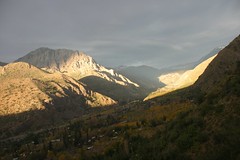Earthquakes, fires, and a history as one of the more remote and poor colonies have meant that Chile’s capital does not have the lasting colonial grandeur that other Latin American capitals might have. The city is large, but not imposing. The mountains hang over the whole city, a point of reference for everyone when giving directions—to get downtown from where I’m staying I was told to “go away from the mountains through Parque Bustamante, take a left when you get to Providenciaâ€. It’s late fall here, and yellow and red leaves are falling from the trees. Mornings are cold when I go catch the metro to go to work, and it’s dark by 5:30.
Perhaps the most striking things about the city for someone who comes from San Francisco is the terrible air quality (April is supposed to be the worst, before the fall rains start in May—and they’re late this year), and the incredible noise of the city, mainly caused by the old diesel busses that much of the population gets around on. I’m staying on the twelfth floor of a building and the first night woke up repeatedly from the street noise below. My ears fairly buzz with the noise all day long.
Over the weekend Andrés took me to El Cajón del Maipo, a large canyon southeast of Santiago where his family has a wonderfully charming house made of hand-carved cypress logs and stucco. They’ve had the house there since the early 1980s, and have built it up little by little over the years, including the gardens (persimmon, apricot, and cherry trees, to name a few) and the house itself. In the afternoon we took a hike up the mountain, just before sunset. The mountains hung above the valley, surrounding it, a ring of jagged rock, spotted with snow, and stretching as far as the eye could see. We ate apples, the last of this fall, picked from a tree near a walnut grove whose leaves were a wash of yellow pigment.
September 11, 1973. Chile’s 9/11. The day of Pinochet’s coup, when the military bombed “El Palacio de La Moneda†(The money castle—the seat of the Chilean government used to be a money mint) and Salvador Allende famously said “I have faith in Chile and its destinyâ€, before committing suicide rather than be killed. The main avenue that cuts across the whole city changes names several times, and for part of the time is called “September 11th Avenueâ€. Memories of the Pinochet dictatorship are still very much alive for people—it directly impacted many peoples’ lives who I’ve talked with, in particular the parents of people my age. One of my colleagues in the training was born in Boston—his parents were able to escape to Iowa in 1973 under a university scholarship. Andrés’ girlfriend has dual-citizenship because she was born in Mexico—her parents lived there for many years. Andrés’ dad was a political prisoner for five months. It’s appalling that my government supported these Latin American dictatorships which were so oppressive. Miami even gave Pinochet a key to the city!
I took a long walk after work tonight, and bought several books to read more about Chile, and try to understand its recent stories and history (and practice reading in Spanish!): Novels and short stories by Roberto Bolaño and Carla Guelfenbein and a historical memoir by Andrés Aylwin Azócar called Simply what I saw (1973-1990).
I’ve been carrying my notebook with me everywhere and writing down impressions, things I’m seeing, conversations I’ve had, and phrases (Chilean Spanish has lots of words and phrases that are different from the Spanisih I’ve known). I’ll write again before the week is out. Hasta entonces.

